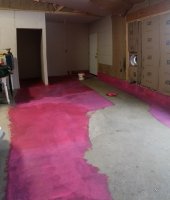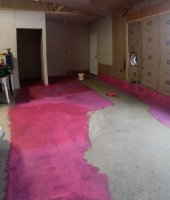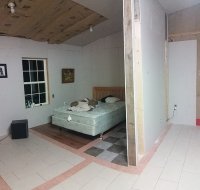Michael Korbel
New Member
Hello all. I came here to these forums to seek advice from good folks like yourself.
In 2014 I bought property which included a 30x40 building. It has a concrete floor with a perimeter of one layer concrete brick, and then 2x6 construction above. When I purchased the building, there were 2 rooms framed out, which I later expanded upon. The building was also insulated prior to purchase with pink insulation. I ran electricity to the building and wired it all up. I used Red Guard and coated the whole garage and then tiled directly over that.
Problem I'm having now is high humidity in the building. My humidity guage is reading 89% humidity for days on end. I saw some mold build up on the drywall which I cleaned with bleach and used Kilz2 paint to cover. I have since put in a 750cfm fan to help keep air moving but there is still high humidity and also looks like spots of water on the concrete/RedGuard where I haven't finished tiling.
The concrete is cold to the touch and the air yesterday was 81degreesF. Is this humidity caused from the cold floor meeting the warm air? How do I combat or solve this issue? Should I insulate the floor? Getting nervous because I don't want to ruin my investment on this building. Any thoughts help--Thanks in advance--Cheers.
In 2014 I bought property which included a 30x40 building. It has a concrete floor with a perimeter of one layer concrete brick, and then 2x6 construction above. When I purchased the building, there were 2 rooms framed out, which I later expanded upon. The building was also insulated prior to purchase with pink insulation. I ran electricity to the building and wired it all up. I used Red Guard and coated the whole garage and then tiled directly over that.
Problem I'm having now is high humidity in the building. My humidity guage is reading 89% humidity for days on end. I saw some mold build up on the drywall which I cleaned with bleach and used Kilz2 paint to cover. I have since put in a 750cfm fan to help keep air moving but there is still high humidity and also looks like spots of water on the concrete/RedGuard where I haven't finished tiling.
The concrete is cold to the touch and the air yesterday was 81degreesF. Is this humidity caused from the cold floor meeting the warm air? How do I combat or solve this issue? Should I insulate the floor? Getting nervous because I don't want to ruin my investment on this building. Any thoughts help--Thanks in advance--Cheers.



